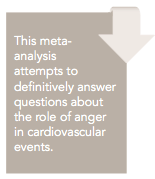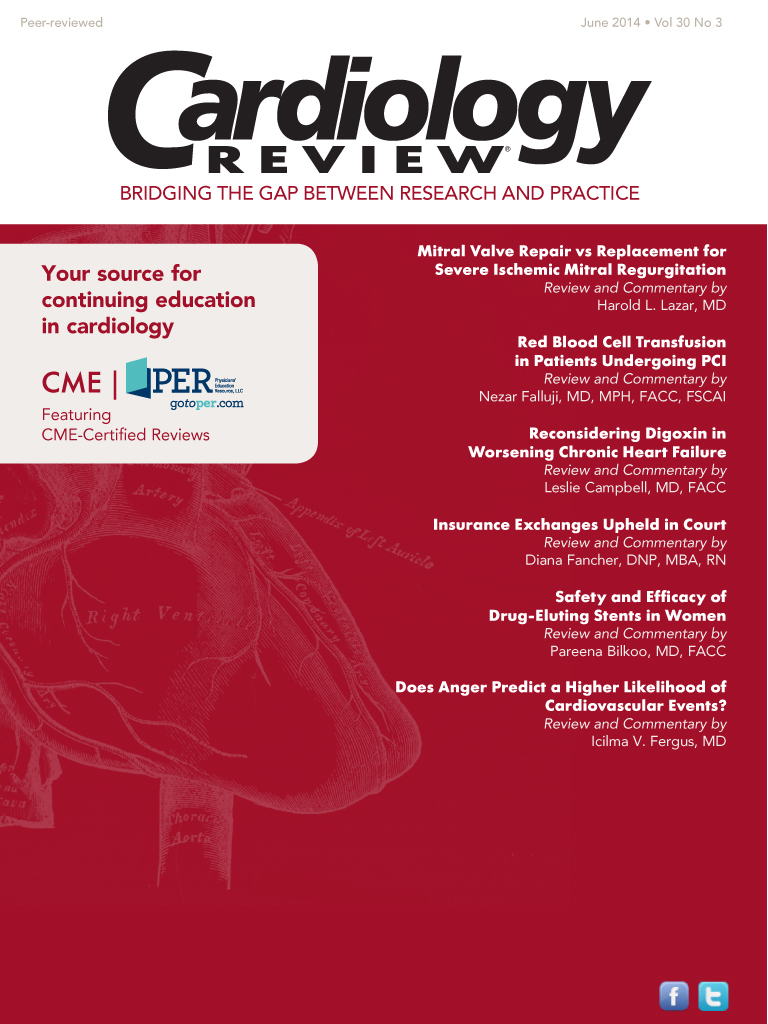Publication
Article
Cardiology Review® Online
Does Anger Predict a Higher Likelihood of Cardiovascular Events?
Author(s):
This meta-analysis attempts to definitively answer questions about the role of anger in cardiovascular events.

Icilma V. Fergus, MD
Review

Eur Heart J.
Mostofsky E, Penner EA, Mittleman MA. Outbursts of anger as a trigger of acute cardiovascular events: a systematic review and meta-analysis [published online March 3, 2014]. doi:10.1093/eurheart/ehu033.
I
t seems reasonable to assume that anger, particularly the explosive variety, would be associated with stress to the cardiovascular (CV) system. Increased heart rate and blood pressure could conceivably increase myocardial work and oxygen demand along with stress factors, and may result in an adverse outcomes to the CV system. Some studies do not show a relationship with anger and CV events, while others1 have reported that episodes of anger are associated with a higher risk. The study by Mostofsky et al attempts to link anger as a precipitant to various CV events including higher risk of myocardial infarction (MI),2
acute coronary syndrome (ACS),3-5
ischemic6 and hemorrhagic stroke,7
and arrhythmia.8,9
There are many factors including cardiovascular risk factors that coexist and overlap in individuals who display anger, and this in part may explain some of the confounding findings seen in many studies. For instance, factors such as catecholamine overexpression with resultant sympathetic drive and deleterious effects associated with increased blood pressure and heart rate may be seen in anger,10 but may also present in other emotional states and be certainly precipitated by several other germane risk factors.
Thus, the question to answer is whether the anger episode correlates directly to the CV event, or do other inherent or underlying risk factors explain the effect? Anger releases epinephrine and norepinephrine, which increase blood pressure and pulse, constrict blood vessels, and make platelets stickier,10 and may be why anger is potentially associated with increased cardiac risk. Several studies have found that anger increases the risk of incident coronary heart disease (CHD), even as others found anger to be protective. Considering this variance in study outcomes, there could be several contributory mechanisms, including adjusting for different types of anger expression, which may be associated with opposing levels of cardiovascular risk. A prior study by Mostofsky et al examined whether distinct types of anger expression differentially predict incident CHD.11 In the Atherosclerosis Risk in Communities (ARIC) study, individuals who were the most prone to anger were 2.69 times more likely to have a heart attack or sudden death than those with the lowest anger ratings on a 40-point scale.12 Individuals who scored a moderate level on an anger scale were 35% more likely to experience a coronary event. Other studies also discuss the fact that anger and hostility are associated with worse CHD outcomes in both healthy and CHD populations.13,14
Considering the vast array of studies that have looked at the question of anger and CVD with varying outcomes, the present review also must be taken in the context of limitations on final interpretation of data. In this meta-analysis, there is inclusion of cross-sectional, retrospective, and prospective studies, as well as prospective cohort investigations. Some of the reviewed studies included for analysis were based on small sample sizes with few exposed cases; thus the results were often reported with low precision. Since there has been no previous systematic evaluation to compare the results and examine whether there is consistency for CV outcome across studies, in this study Mostofsky et al attempted to answer the direct question of whether anger is a predictor for CV events by filtering thousands of studies and narrowing them down to 9 for the final analysis.
Study Design
This study was performed based on pooled data from studies conducted between January 1966 and June 2013. A meta-analysis protocol was followed throughout the design, implementation, analysis, and reporting processes.15 Several databases were utilized looking for the key words “anger,” “hostility,” “aggression,” “mental stress,” and “cardiovascular diseases.” Nine independent cross-over studies were extracted from a total of 6870 publications. These publications were further assessed excluding 1299 duplicates. Furthermore, an additional 5565 articles were excluded after the review of the title or abstract. Incidence rate ratios and 95% confidence intervals (CIs) were calculated with inverse-variance-weighted random-effect models. Studies were eligible for review based on 3 criteria: (1) the design was a cohort, a case—control, a self-controlled case series, or a case-crossover study; (2) the investigators reported relative risks and 95% CI for the association between outbursts of anger and CV events, and (3) the investigators evaluated hazard periods for triggers occurring within 1 month before event onset.
Statistical analyses were performed to pool the relative risks from individual studies,16 and to calculate heterogeneity across studies,17 between-study heterogeneity attributable to variability in the association rather than sampling variation,18,19
and publication bias.19-21 Stratified analyses were performed to evaluate the influences of incident versus recurrent events and MI versus ACS, and sensitivity analyses were performed to assess whether the results were driven by a single study. The absolute risk of cardiovascular events associated with anger was listed as low (5%), medium (10%), and high (20%) 10-year risk of coronary heart disease.21,22
I
After exclusion criteria were applied to the original 6000 studies, 9 studies, published between 1995 and 2013, were reviewed. Included in the 9 were 4 studies investigating MI/ACS, 2 on ischemic stroke, 2 on ventricular arrhythmias, and 1 on ruptured intracranial aneurysm. There was evidence of substantial heterogeneity between the studies (2 = 92.5% for MI/ACS and 89.8% for ischemic stroke). A total of 4546 cases of MI were reviewed, 462 cases of ACS, 590 cases of ischemic stroke, 215 cases of hemorrhagic stroke, and 306 cases of arrhythmia.
P
Q
P<
I
Q
P
I
Q
P<
I
Q
P
I
Q
P
I
There was a 4.74 (95% CI, 2.50-8.99; <.001) times higher risk of MI or ACS in the 2 hours following outbursts of anger compared with other times based on the random effect meta-analysis in 4 studies. However, there was heterogeneity (= 39.80; .001; 2 = 92.5%). Despite the fact that a pooled estimate may not be appropriate due to differences, there appeared to be a higher evidence of MI/ACS risk following episodes of anger. As noted in the original paper, the results were stronger for studies of incident events (Incident Rates Ratio [IRR] = 5.47, 95% CI, 3.83-7.80; = 0.02; = .86; 2 = 0%) than for studies including both incident and recurrent events (IRR = 4.17, 95% CI, 1.42-12.26; = 31.96; .001;2 = 96.9% and higher for studies of ACS (IRR = 6.45, 95% CI, 4.80-8.99; = 1.24, = .27; 2 = 19.1%) than studies of MI (IRR = 3.52, 95% CI, 1.54-8.06; = 6.47, = .01; 2 = 84.5%).
P
With respect to other CNS events, the rate of ischemic stroke in the 2 hours following an outburst of anger was 3.62 (95% CI, 0.82-16.08; = .09) times higher. Regarding ventricular arrhythmias, results were demonstrated in 2 studies with different designs including a meeting abstract, and thus could not be meta-analyzed but showed that there was a 3.20 (95% CI, 1.80-5.70) times higher rate of ventricular tachycardia or ventricular fibrillation in the hour following moderate levels of anger and 16.7 times higher (95% CI, 8.12-34.5) in the hour after intense anger. In addition, the relative risk of a CV event is increased with more frequent outbursts of anger and in people noted to have higher baseline cardiovascular risk.
CommentaryCompelling But Limited Findings
T
his brief review of the question of whether anger predicts cardiovascular events offers compelling answers to the relationship but does not completely solve the equation, as the 9 case-crossover studies are quite heterogeneous and several limitations can be postulated. Despite the large body of literature that describes the correlation, less than 0.001% of the work could be utilized for the meta-analysis as there were only 9 usable studies out of 5565. Even among these 9 studies, significant heterogeneity was demonstrated. Eight of the 9 studies used the Onset Anger Scale,3 which is the standard tool used to assess anger; however, each study may have administered the scale differently. Baseline patient characteristics may have been different among the studies, affecting overall risk for CVD. One has to recall in this study that although findings were suggestive, measurements often did not reach statistical significance, limiting the interpretation of the results.
Among potential confounders is whether the level of intensity of the anger makes a difference with respect to which type of CVD outcome may be seen. Only 3 of the 9 studies focused on level of intensity of anger as a contributor.5,10,12 Thus the finding that the intensity of anger correlates with MI was found in only 1 study.4 The type of medications that may be beneficial is questionable, although it is suggested that beta-blockade, aspirin, or calcium-channel blockers may lower the risk from each anger outburst. However, maybe the benefits of the drugs mitigate the effects of anger in these patients or just blunt the effects of the other risk factors enough to where anger is not the causative factor.3-5,9,23
In addition, some of the studies that were analyzed in this meta-analysis were not powered to assess whether other cardiac risk factors could have been triggers for CV events, such as socioeconomic factors, compliance, and medical history. Several of the cited studies evaluated whether the risk of a cardiovascular event triggered by anger outbursts may be mitigated by medical history, socioeconomic factors, or regular medication use. Some of the studies, such as those that focused on the CVD outcomes, did not assess these parameters. This again shows that each study’s evaluative components were intrinsically different, and limits inferences that could be made from the end points drawn in the meta-analysis.
Each study revealed different associations and relationships to anger, some based on “anger trait”—low level background of anger, more frequent outbursts, suppressed anger, the strength of the anger, etc. It is clear that there may be different mechanisms linking anger to CVD events. In addition, is the outcome unique to anger or is it related to the other components that can be associated with anger, such as stress, anxiety, and depression? The resultant catecholamine surge results in increases in heart rate and blood pressure as well as increases in systemic vascular resistance that can lead to changes in the vascular bed, disrupting plaques and increasing inflammatory stimulants.1,6,24 This series of events is not unique to anger, and again the results have to be interpreted with caution.
Since the individuals studied were variable across the studies, whether the impact of anger versus underlying risk factors played more of a role in the resultant cardiovascular events is an issue that is confronted in meta-analyses.25 The case-cross-over design22
is helpful to compare levels of anger of each individual at different periods of time, which helps to strengthen the association of anger with an event using individuals as their own comparators.3,4
In conclusion, several limitations are evident in this meta-analysis, including population differences among the studies and differences in study protocols. Thus these results must be interpreted with caution. Not all of the 9 studies could be accurately meta-analyzed due to variability among the studies and methods of data collection and reporting. There may be cardiometabolic risk factors that simply become amplified due to the body’s state in anger situations. Perhaps other emotional states such as depression and stress may be equally predictive. Nevertheless, the authors clearly categorize findings that suggest that within the 2 hours following an anger outburst, there is a higher risk of MI, ACS, ischemic and hemorrhagic stroke, as well as arrhythmia. Overall, this meta-analysis is a helpful guide in characterizing additional risk categories when assessing patients prone to cardiovascular events.
 
References
Circulation.
1. Mittleman MA, Mostofsky E. Physical, psychological and chemical triggers of acute cardiovascular events: preventive strategies. 2011;124:346-354.
Circulation.
2. Mittleman MA, Maclure M, Sherwood JB, et al. Triggering of acute myocardial infarction onset by episodes of anger. Determinants of Myocardial Infarction Onset Study Investigators. 1995;92:1720-1725.
Psychosom Med
3. Moller J, Hallqvist J, Diderichsen F, Theorell T, Reuterwall C, Ahlbom A. Do episodes of anger trigger myocardial infarction? A case-crossover analysis in the Stockholm Heart Epidemiology Program (SHEEP). .1999;61:842-849.
Am J Cardiol.
4. Mostofsky E, Maclure M, Tofler GH, Muller JE, Mittleman MA. Relation of outbursts of anger and risk of acute myocardial infarction. 2013;112:343-348.
Heart.
5. Strike PC, Perkins-Porras L, Whitehead DL, McEwanJ, Steptoe A. Triggering of acute coronary syndromes by physical exertion and anger: clinical and sociodemographic characteristics. 2006;92:1035-1040.
Neurology.
6. Koton S, Tanne D, Bornstein NM, Green MS. Triggering risk factors for ischemic stroke: a case-crossover study. 2004;63:2006-2010.
Stroke.
7. Vlak MH, Rinkel GJ, Greebe P, van der Bom JG, Algra A. Trigger factors and their attributable risk for rupture of intracranial aneurysms: a case-crossover study. 2011;42:1878-1882.
Circulation.
8. Lampert R, Joska T, Burg MM, Batsford WP, McPherson CA, Jain D. Emotional and physical precipitants of ventricular arrhythmia. 2002;106:1800-1805.
Circulation.
9. Albert C, Lampert R, Conti J, et al. Episodes of anger trigger ventricular arrhythmias in patients with implantable cardioverter defibrillators. American Heart Association Scientific Sessions 2006. 2006;114(suppl):831. Abstract 3873.
N Engl J Med.
10. Danesh J, Wheeler JG, Hirschfield GM, et al. C-reactive protein and other circulating markers of inflammation in the prediction of coronary heart disease. 2004;350:1387-1397.
Am Heart J.
11. Davidson K, Mostofsky E. Anger expression and risk of coronary heart disease: evidence from the Nova Scotia Health Survey. 2010;159:199-206.
Circulation.
12. Williams JE, Paton CC, Seigler IC, Eigenbrodt ML, Nieto FJ, Tyroler HA. Anger proneness predicts coronary heart disease risk: protective analysis from the atherosclerosis risk in communities (ARIC) study. 2000;101:2034-2139.
J Am Coll Cardiol
13. Chida Y, Steptoe A. The association of anger and hostility with future coronary heart disease: a meta-analytic review of prospective evidence. . 2009;53:936-946.
J Am Coll Cardiol.
14. Denollet J, Pedersen SS. Anger, depression, and anxiety in cardiac patients. 2009;53:947-949.
JAMA.
15. Stroup DF, Berlin JA, Morton SC, et al. Meta-analysis of observational studies in epidemiology: a proposal for reporting. Meta-analysis of Observational Studies in Epidemiology (MOOSE) group. 2000;283:2008-2012.
Control Clin Trials.
16. DerSimonian R, Laird N. Meta-analysis in clinical trials. 1986;7:177-188.
Biometrics.
17. Cochran W. The combination of estimates from different experiments. 1954;10:101-129.
Statist Med.
18. Higgins JP, Thompson SG. Quantifying heterogeneity in a meta-analysis. 2002;21:1539-1558.
Biometrics.
19. Begg CB, Mazumdar M. Operating characteristics of a rank correlation test for publication bias. 1994;50:1088-1101.
BMJ.
20. Egger M, Davey Smith G, Schneider M, Minder C. Bias in meta-analysis detected by a simple, graphical test. 1997;315:629-634.
Circulation.
21. Wilson PW, D’Agostino RB, Levy D, Belanger AM, Silbershatz H, Kannel WB. Prediction of coronary heart disease using risk factor categories. 1998;97:1837-1847.
Am J Epidemiol.
22. Mittleman MA, Maclure M, Robins JM. Control sampling strategies for casecrossover studies: an assessment of relative efficiency. 1995;142:91-98.
Am J Cardiol.
23. Culic V, Eterovic D, Miric D, Rumboldt Z, Hozo I. Gender differences in triggering of acute myocardial infarction. 2000;85:753-756, A758.
Nat Rev Cardiol.
24. Steptoe A, Kivimaki M. Stress and cardiovascular disease. 2012;9:360-370.
Am J Epidemiol.
25. Maclure M. The case-crossover design: a method for studying transient effects on the risk of acute events. 1991;133:144-153.
About the Author
Icilma V. Fergus, MD, FACC,
is associate professor of medicine and director of the Mount Sinai Heart Cardiovascular Disparities Center, New York, NY. She is also an adjunct professor of medicine at Touro College of Ostheopathic Medicine in New York City and assistant professor of clinical medicine at Columbia University Medical Center, College of Physicians and Surgeons, New York, NY. Dr. Fergus is president of the Association of Black Cardiologists. She received her MD from the State University of New York Downstate Medical Center, Brooklyn, NY, and was a cardiology fellow at Cornell Medical Center/New York Hospital, New York, NY. She has lectured and published extensively.






